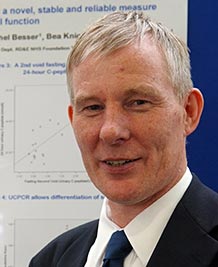
Professor Andrew Hattersley
Royal Society Fellowship for Peninsula Medical School professor
Professor Andrew Hattersley from the Peninsula Medical School, the University of Exeter and Royal Devon & Exeter Hospital NHS Trust has been elected a Fellow of the Royal Society.
The Royal Society is the world’s oldest scientific academy in continuous existence. Its ethos is to support excellence in science and each year it elects 44 new Fellows and eight new Foreign Members, chosen for their scientific achievements.
Current Fellows include Stephen Hawking, Tim Berners Lee and Richard Dawkins. Historic figures who have been Fellows of the Royal Society include Isaac Newton, Christopher Wren and Charles Darwin.
Professor Hattersley is the first scientist from the Peninsula Medical School and one of a handful of scientists from the University of Exeter to receive this honour.
Andrew Hattersley came to Exeter in 1995 as an NHS Consultant working in Diabetes doing one day a weeks of research. With Professor Sian Ellard he set up a genetics laboratory in the Royal Devon and Exeter hospital. The success of their research and ever growing research team meant he gradually spent more time researching but has remaining working as a doctor in the MacLeod Diabetes and Endocrine centre as well as being a research Professor in the Peninsula Medical School.
Professor Hattersley has worked on understanding the genetic basic of diabetes and using this knowledge to improve patients’ care. He heads the leading international research team working on diabetes resulting from a single genetic change. The lab provides genetic testing to patients throughout the world and has received samples from over 60 countries. In the last 15 years he and his team in Exeter have published over 350 papers and secured a total of over £21 million in grants for research.
The Royal Society when announcing his award supported this by saying: “His clinical observations and physiological studies in patients with diabetes resulting from mutations in single genes have resulted in key insights into insulin secretion, foetal development, and patients’ clinical care. Importantly his work led him to revolutionise treatment for most patients with genetic subtypes of diabetes by replacing insulin injections with sulphonylurea tablets.”
Commenting on his Fellowship Professor Hattersley said: “I am absolutely delighted and surprised to have received this great honour. This is an award for the whole Exeter team: there is no way I would ever had achieved anything without the superb colleagues I have worked with over the last 15 years and the outstanding support of the Royal Devon and Exeter Hospital NHS Trust, the Peninsula Medical School and the University of Exeter. None of our research could have happened without our clinical colleagues and patients who have supported our work throughout.”
He continued: “The greatest thrill for me, and the rest of the team, is not awards or papers but knowing that for some patients our science has made a big difference to their lives.”
Date: 21 May 2010
